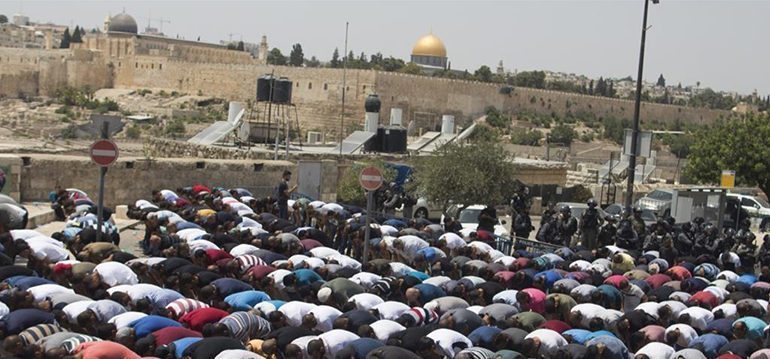JERUSALEM – Palestinians have vowed to continue protests and confrontations with Israeli forces in occupied East Jerusalem and the West Bank, in rejection of new surveillance cameras installed at the gates to al-Aqsa Mosque compound.

Israel’s new measures of control at al-Aqsa compound have been described as collective punishment for Palestinians. Reuters
After a security cabinet meeting late on Monday, a statement from Israeli Prime Minister Benjamin Netanyahu confirmed that the cabinet “accepted the recommendation of all of the security bodies to incorporate security measures based on advanced technologies … and other measures instead of metal detectors”.
Israel said the “plan” would be implemented within the next six months, with a budget of 100 million shekels ($28m). Some of the proposed alternatives to the metal detectors include cameras with thermal systems that can detect weapons and a facial recognition feature.
Despite the removal of the metal detectors, experts and lawyers say the cameras are an even bigger threat to Palestinians, presenting yet another violation of international law.
“These cameras will be able to detect faces and identities. This means that Israel is imposing complete control over the al-Haram al-Sharif area. The Jordanian role is being sidelined and the presence of Palestinian guards becomes null, because the real players are going to be those behind the screens watching the cameras,” Khalil Shaheen, a Ramallah-based political analyst, told Al Jazeera.
The spike in tensions and the deaths of three Israelis and four Palestinians in violence on Friday and Saturday raised international alarm and prompted a session of the United Nations Security Council to consider ways of defusing the crisis.
“All parties should work to reduce these tensions and we offer whatever assistance we can in helping to do this,” Nikki Haley, U.S. ambassador to the United Nations, told the Security Council in New York. “At the holy sites, it’s vital that both access and security be ensured.” Washington has already held talks with Israel and Jordan to help resolve the crisis.
Palestinian President Mahmoud Abbas and the senior Muslim cleric who oversees Al-Aqsa compound both dismissed the new Israeli measures and demanded all of them be removed.
“All new Israeli measures put in place since (July 14) must be removed so things can go back to normal in Jerusalem and we can resume our work regarding bilateral relations,” Abbas said at the beginning of a meeting with the Palestinian leadership.
The Waqf, the religious body that runs the Islamic sites in the Al-Aqsa compound, said worshippers would continue to stay away from the elevated, marble-and-stone plaza – Islam’s third holiest site – and pray in the streets outside.
While Jordan retains control over al-Aqsa compound through the Islamic Waqf that administers the holy site, Israel imposes control on areas outside the compound through its occupation of East Jerusalem, where the Old City lies.
The installation of metal detectors caused civil disobedience and spurred protests by Palestinians, who viewed the new measures as Israel’s attempt to impose further control on the holy site. For Palestinians, installing cameras on the entrances to the al-Aqsa Mosque compound is yet another manifestation of Israeli control over the holy site.
Israel, which illegally annexed East Jerusalem in 1967, imposes control throughout the Old City through the presence of its forces and more than 400 cameras lining the alleyways of the World Heritage site. Plans to install similar cameras on the gates to al-Aqsa have been floated by the Israeli government over the years, but were rejected by Palestinian leaders and locals.






Leave a Reply